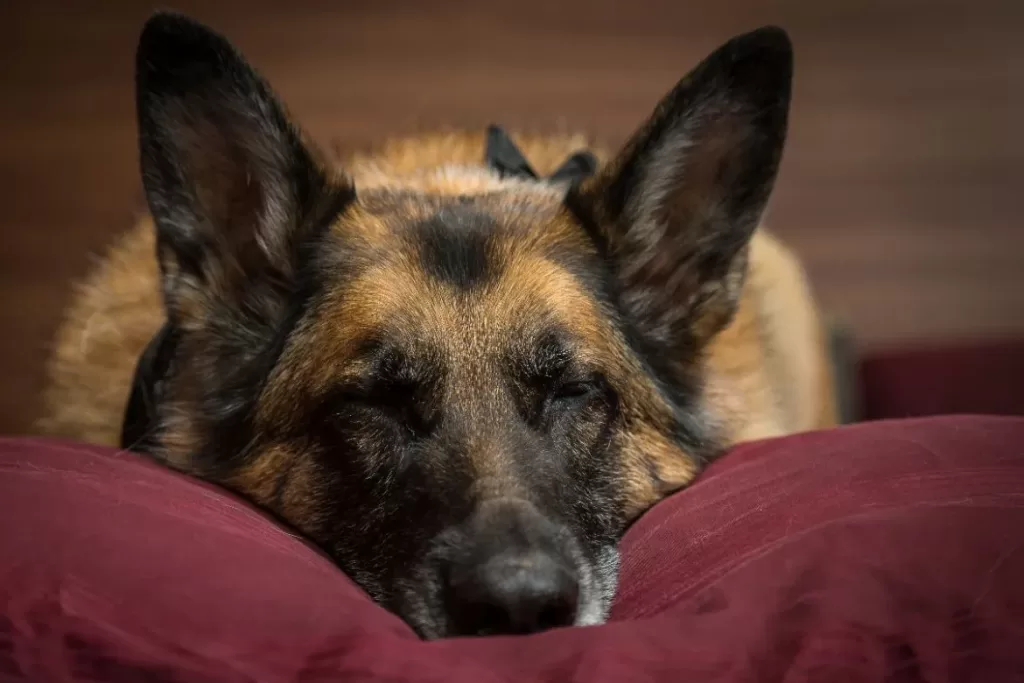Being a dog owner, you need to take a lot of care about so many things and one among them is Dog’s Sleep. Pet care is not an easy task and taking care of the smallest things matters a lot.
Table of Contents
Because the good health of your pet is a top priority to maintain a happier and healthy lifestyle.
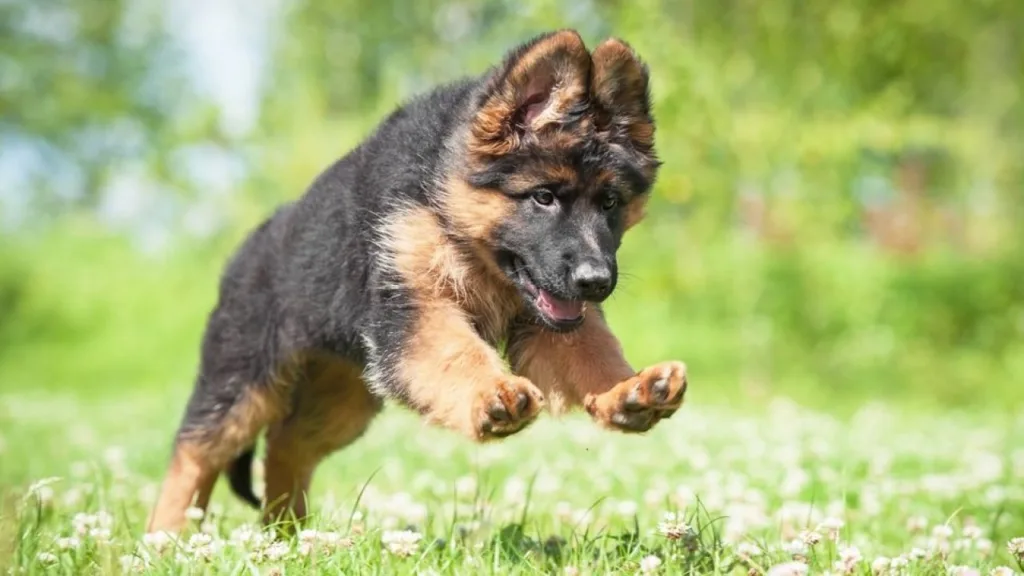
But have you ever noticed a sudden change in your dog’s behavior? Still, you are not figuring out what is the actual cause of this change.
One main reason for this changing behavior can be the sleep cycle. If your dog is not getting proper sleep then it can be difficult to maintain a healthy lifestyle.
Sleep plays a prominent role in your pet’s life as well and it is a major factor that makes him active and energetic.
So, it is necessary to help the dog sleep properly and get a better sleep every night.
Sweet Dreams for Your Furry Friend: Unraveling Dog’s Sleep
Have you ever wondered what a day in the life of your beloved canine companion is like when the lights go out? Just like us, dogs need their beauty sleep, but what happens when their slumber is disturbed? In this eye-opening exploration, we dive into the fascinating world of canine sleep disorders and their intriguing effects on our four-legged friends.
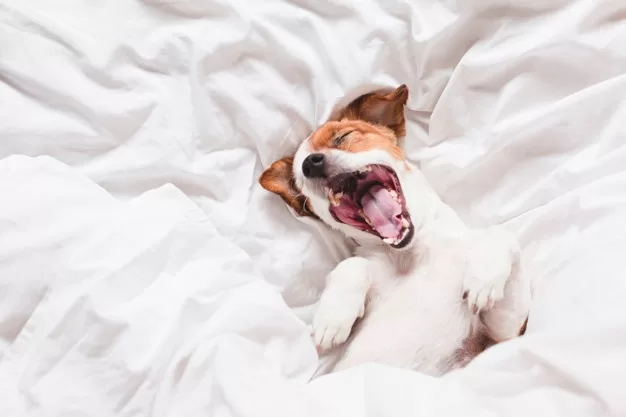
A doggy dreamland where our furry pals should ideally get a solid 12 to 14 hours of sleep per day. This isn’t just laziness; it’s essential for their physical and mental well-being. Much like us, dogs experience various sleep cycles, including rapid eye movement (REM) and deep sleep. However, when these precious hours are disrupted, a chain reaction of consequences can occur.
The Sleep-Starved Pup: Unveiling the Effects
Imagine your dog missing out on their much-needed shut-eye. The consequences can be as serious as a crime thriller. When a dog doesn’t hit that 12-14-hour snooze quota, stress hormones start to pile up. It’s a bit like a ticking time bomb.
Energy Drain or Anger Management?
One possible outcome of sleep deprivation is a lack of energy. Think of your dog as a mini-Energizer bunny running low on batteries. They become sluggish, demotivated, and downright lethargic. Not the bundle of joy you’re used to, right?
But here’s the twist: a sleep-deprived dog can also turn into a grumpy Gus. Yep, that’s right—aggression can rear its ugly head. Just like a cranky toddler deprived of their naptime, dogs can get snappy when their sleep is interrupted. So, if your usually mild-mannered buddy suddenly transforms into a snarling beast, it might be time to check their sleep schedule.
Immune System Under Siege
A sleep-deprived dog is like a castle without guards. Their immune system takes a hit, making them susceptible to infections. It’s as if their defense walls have crumbled, leaving them vulnerable to the nefarious forces of bacteria and viruses.
The Villains: Canine Sleep Disorders
Now, let’s shine a spotlight on the culprits behind this canine sleep deprivation drama—sleep disorders that can plague our furry friends.
Insomnia: The Sleep Thief
Meet the notorious Insomnia, the sleep thief of the doggy world. It’s often tied to physical discomfort caused by arthritis, pesky fleas, or even a kidney infection. Just like when you can’t get comfy in bed, dogs with insomnia toss and turn, desperately seeking that elusive good night’s sleep.
Sleep Apnea: The Silent Saboteur
Sleep apnea, a condition not limited to humans, can also be a sneaky intruder in the world of dogs. It’s more common in overweight canines and those with flat-faced breeds. Picture your dog snoring louder than a freight train and then suddenly gasping for air—this is sleep apnea’s hallmark. Not a restful night, that’s for sure!
Narcolepsy: The Unpredictable Snoozer
Narcolepsy is like a surprise party no one asked for. It’s typically a genetically-rooted propensity for dogs to collapse into deep sleep without warning. Imagine your pup mid-fetch and suddenly, bam! They’re taking an impromptu nap, right on the spot.
REM Behavior Disorder: The Sleep-Walker
Have you ever seen a sleep-walking dog? Well, REM Behavior Disorder in dogs is just that—a canine version of sleep-walking. They may act out their dreams, making nighttime a bit more adventurous than you’d expect.
While our furry pals may seem like they’ve got it all figured out when it comes to sleep, it’s important to recognize the signs of sleep disorders and their potential effects. After all, a well-rested dog is a happy dog, and ensuring they get their beauty sleep is essential for their health and happiness.
So, the next time you see Fido dozing off in the middle of a game of fetch, don’t worry—they might just be indulging in a little doggy Dreamtime. Sweet dreams, four-legged friends!
How To Enhance Healthy Sleep in Dogs?
Some tips can help you improve the quality of your dog’s sleep. If your dog is struggling with sleep then these tips can help you provide him a peaceful sleep.
Make your Dog Follow a Proper Routine
Keeping track of the everyday activities of your fur buddy is one of the important steps that help to promote sleep.
It matters a lot what he is eating, drinking, or does all day and at which time. Allow him to follow a proper schedule whether it is feeding, playing, or nap time.
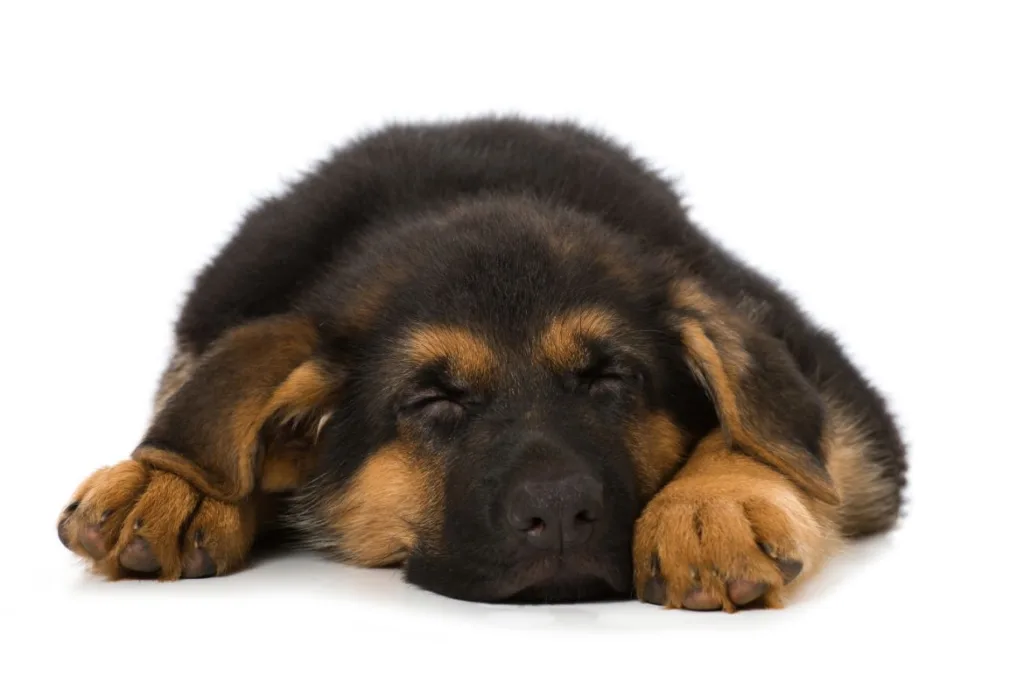
Eating habits or irregular naps can be a cause of your dog faces difficulty falling asleep at night.
Plan everything and set a proper time for meals, playing, exercise, and most importantly nap time. It will be a great help for your dog to get better sleep during the nighttime.
Take him on Regular Exercise
Exercise also plays a prominent role that helping to maintain a healthy lifestyle and to provide good sleep to your dog.
Take him on a walk regularly, and involve him in engaging activities to make him active and happy.

Most of the time staying indoors for the longest time can badly affect the dog’s mental health and as a result, he suffers to get a peaceful sleep. To avoid this and to make him feel better involve your dog in plenty of exercises whether indoor or outdoor exercises.
Decrease Loneliness and Stress from your Dog’s Life
One of the other major causes that can be the reason your dog is not getting proper sleep at night is sadness or loneliness.
Pets are creatures that need complete attention and love from their owners.
And when they feel like they do not get enough of it they become stressed, sad, and feel lonely.
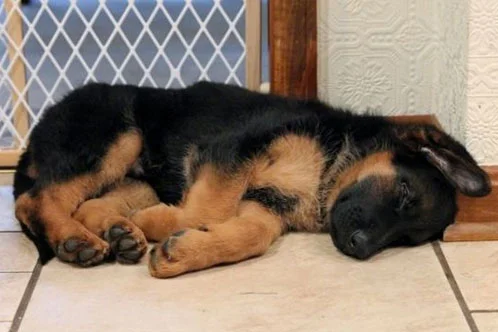
So, it is very important to first figure out what is the actual cause of your dog’s loneliness.
Also Read: 4 Tips for Dog Grooming Equipment maintenance and success
Spend more time with your pet and show how much you care about him. Play games with your dog as it will help him cheer up and sleep peacefully.
Let him Sleep in the Same Place Every Night
Most of the time the dogs struggle to get proper sleep in a different place to sleep. Changing your dog’s bed can disturb the sleep cycle of your dog.
Pets like to sleep at the same place and most of the pets do not like change in their lifestyle.
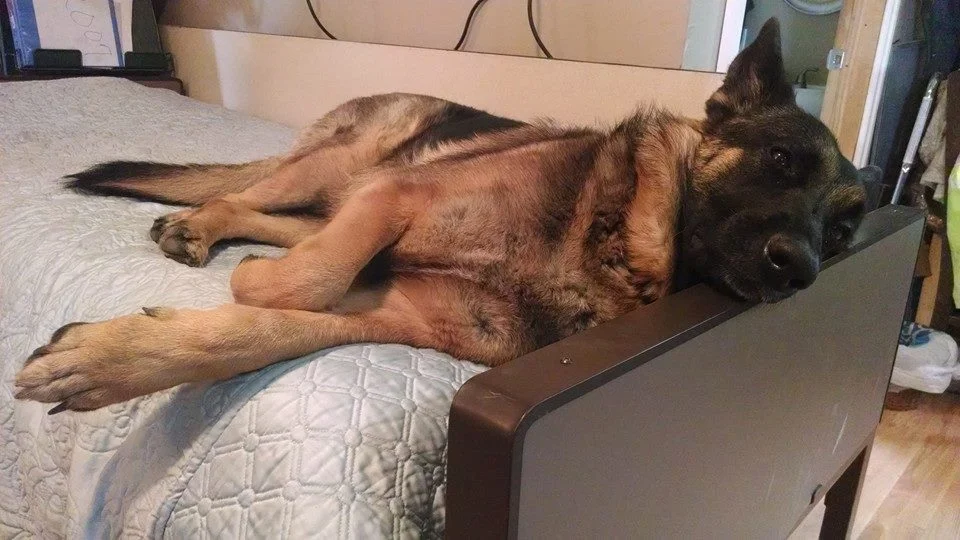
Sleeping at a new place can be challenging for your dog as it will take a lot of time to adjust. As a result, your dog will not get better sleep during the night and it can directly affect his performance.
Allow him to sleep on the same bed to get the most comfortable sleep at night.
Make the Sleeping Environment Comfortable for the Dog
Besides sleeping on the same spot or in the same bed every night another thing that matters is a good sleeping environment.
Make sure the environment is perfect according to your dog’s demands. Choose a comfortable bed for your dog where he can enjoy a peaceful sleep.
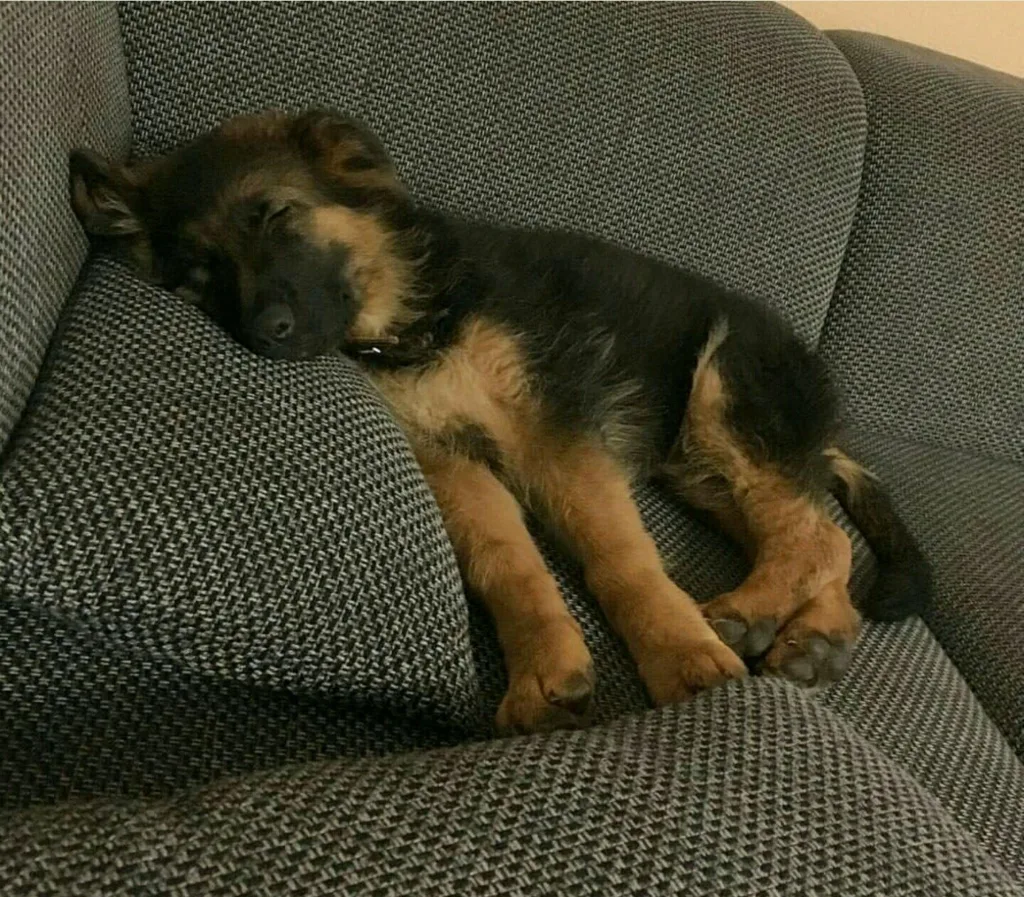
Create a cozy environment for your dog to make him fall asleep. When it comes to sleep the dog’s, bed plays a vital role.
The more comfortable your dog’s bed is better he will get sleep. During the time of sleep try every possible way to eliminate distractions, so that your dog will not struggle to sleep.
Make the bed comfortable and compliment it with a warm blanket. Dim the lights and set a perfect environment. It will help promote sleep.
Unraveling the Canine Sleep Mystery: How long do dogs sleep at night?
Have you ever wondered what goes on in your dog’s mind when they hit the snooze button? Or maybe you’ve caught your furry friend taking a catnap in the middle of the day? Dogs, it turns out, are sleep aficionados, but their sleep schedule is nothing short of fascinating. In this illuminating dive into the world of canine slumber, we’ll uncover the secrets of how long dogs sleep at night and what you can do to ensure they get their well-deserved beauty rest.
The Rhythmic Dance of Doggy Dreams
Dogs are masters of the art of slumber, and they dance to the beat of a polyphasic sleep cycle. Now, what’s that, you ask? It’s a fancy way of saying that dogs don’t just hit the sack once and call it a night like we do. No, they indulge in multiple siestas throughout the day and night. It’s like a never-ending sleep fiesta!
Numbers Speak Louder Than Barks
So, just how much shut-eye does your furry companion need to stay at the top of their game? According to the pet experts at Petful, the magic number for adult dogs is around 12 to 14 hours of sleep per day, on average. That’s right, your pooch might be catching some Z’s while you’re out and about. And if you’ve ever wondered why your canine pal can’t seem to resist a cozy spot for a nap, well, now you know—it’s all part of their master sleep plan.
The Night Owl Conundrum
Now, here’s where it gets intriguing. While your dog might clock in those daytime catnaps like a pro, expecting them to sleep a solid 8 hours straight through the night is like waiting for a unicorn to show up in your backyard. It’s not impossible, but it’s rare.
But fear not, for there are ways to help your furry friend embrace the rhythm of nighttime sleep. After all, a well-rested pup is a happy pup, and a happy pup means a happy owner!
Tips to Foster Nighttime Slumber
- Bedtime Routine: Establish a calming bedtime routine for your dog. A soothing pre-sleep ritual, such as a gentle walk or some relaxing cuddles, can signal to your dog that it’s time to wind down.
- Comfort is Key: Ensure your dog’s sleeping area is comfortable and cozy. Invest in a plush bed or blankets that your furry friend can snuggle into.
- Consistent Schedule: Try to stick to a consistent feeding and bathroom schedule. This can help regulate your dog’s internal clock and make them more inclined to sleep through the night.
- Dim the Lights: Create a peaceful sleeping environment by dimming the lights and minimizing noise. A serene setting can work wonders for a good night’s sleep.
- Limit Late-Night Excitement: Avoid stimulating activities right before bedtime. A wild game of fetch or a high-energy play session can leave your dog too wired to sleep.
- Consult a Professional: If your dog’s nighttime restlessness persists, consider consulting a veterinarian or a canine behaviorist. There could be an underlying issue that needs attention.
Our canine companions may have a unique approach to sleep, but understanding their sleep patterns and making a few adjustments can help them get the rest they need. So, the next time your dog drifts off into dreamland during a lazy afternoon, remember—it’s all part of their fascinating sleep story. Sweet dreams, furry friends!
Conclusion
Sleep difficulties or sleeping disorders in dogs can be common in dogs and it can be both major to minor.
Various reasons can be a cause of this irregular sleep cycle in dogs and it is very important to figure out the actual cause.
If you are one of the pet owners who face the same issue then follow the above-mentioned tips that can help your dog get quality sleep.

